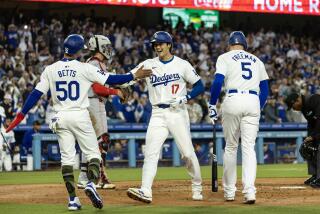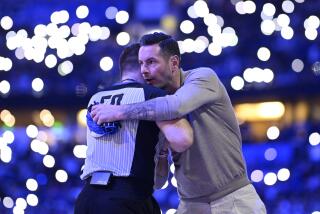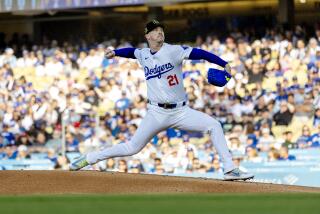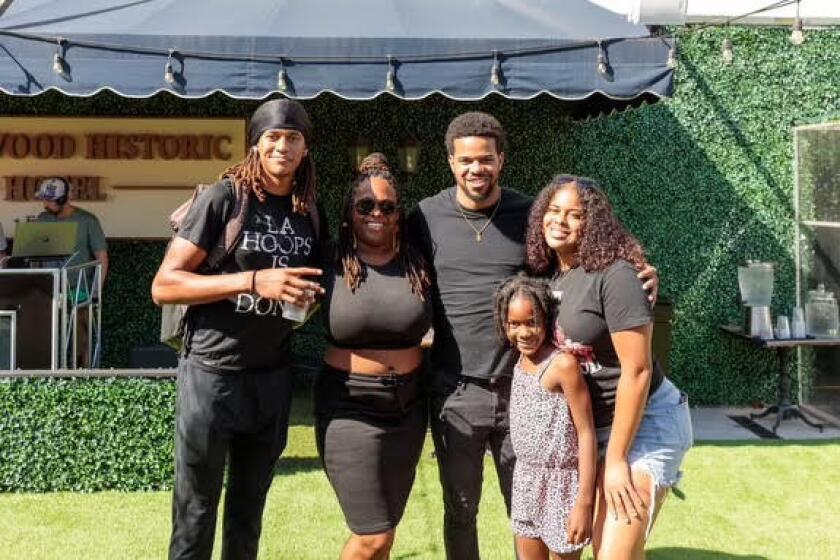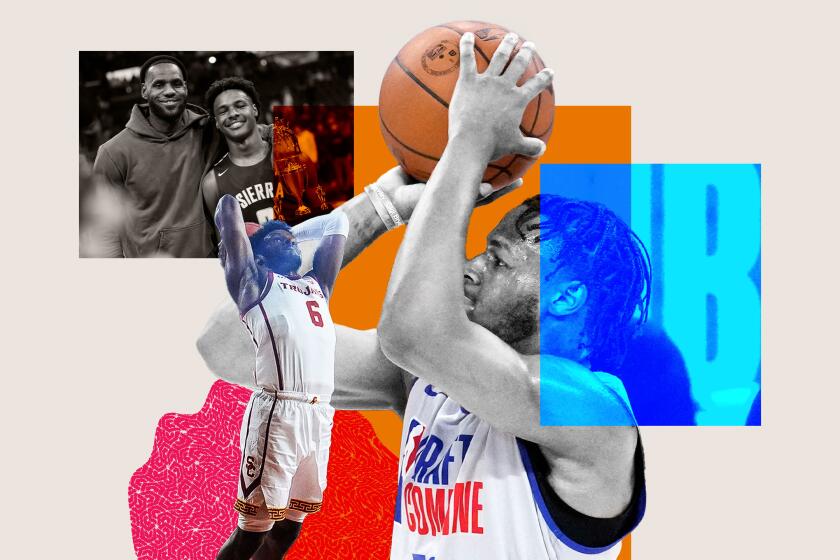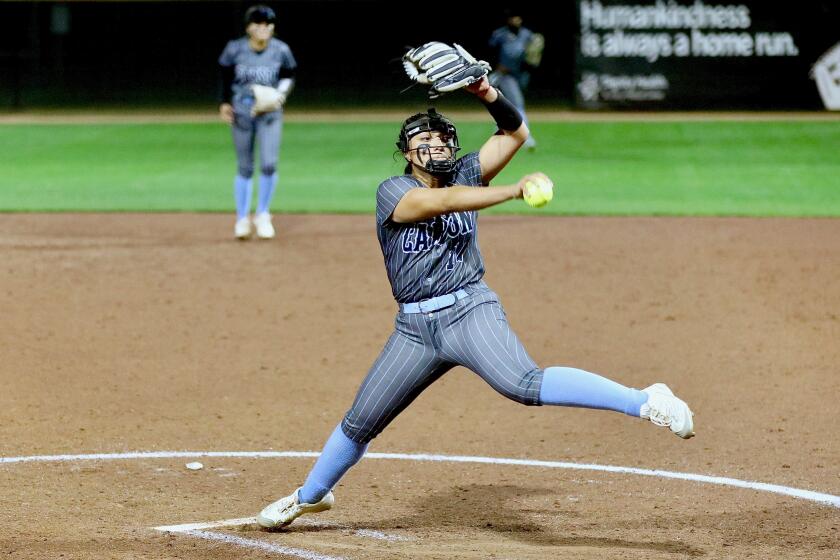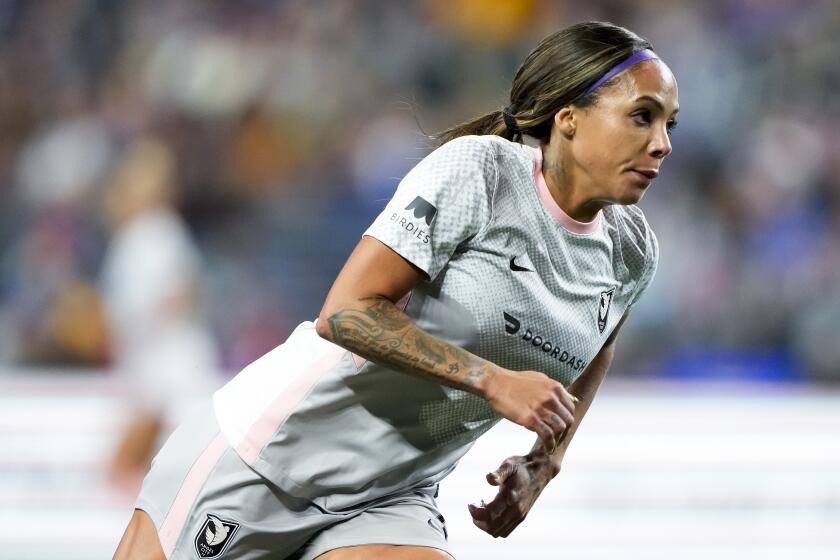Hearn Still Had Game in an Age Without It
It’s a lie to say, as many no doubt will, that age never caught up with Chick Hearn. Anyone who watched Laker games these past few years and heard sidekick Stu Lantz subtly correct Chick when he confused Kobe Bryant with Rick Fox or Robert Horry knows his game had lost a step, in the same way an aging point guard’s does.
Still, TV viewers and radio listeners seemed willing to cut Hearn considerable slack, for reasons that included what he represented, what he had been and, perhaps most important in light of the current marriage of sports and media, what he wasn’t.
Hearn had an act, to be sure, a collection of catchphrases and colloquialisms that will probably never be equaled in sports. From faking someone “into the popcorn machine” to a dribbler “yo-yoing up and down” to an uncalled foul being “no harm, no foul, no ambulance,” he peppered his play-by-play with witticisms meant to entertain every bit as much as they painted what he liked to call his “words-eye view.”
Foremost, however, Hearn’s genuine passion for the game shined through, in stark contrast to the current breed of sportscasters, who too often sound as if their broadcasts are little more than auditions for thinly veiled ambitions to replace Letterman or Leno.
At some point, you see, it was decided in TV sports circles that the action itself isn’t entertainment enough. There were untold games to be found on cable, after all, and everyone has access to the same clips and highlights. Couple that with Craig Kilborn’s graduation from ESPN sports anchor to late-night funny man, and the prevailing wisdom has become that the actual play is secondary--a setup, in essence, for a series of elaborate (and usually forced) punch lines.
Sportscasters were thus transformed into entertainers, from the nightly “Can you top this?” exchange of one-liners on ESPN and Fox Sports West’s recap shows to the blustering bombast of basketball commentators such as Dick Vitale and Bill Raftery, whose shrieks and squawks and fabricated excitement--if briefly amusing at first--quickly make any true sports fan wince and reach for the “mute” button.
Even John Madden--charming initially with his grunts, sound effects and preoccupation with muddy, over-sized linemen--gradually slipped into self-parody, an excess made all the more glaring by younger football commentators who chimed in with their own “Batman”-derived “Wham! Boom! Pow!” exclamations.
None of this, fortunately, was ever true of Hearn. Yes, he was a character, but even in his wackiest, zaniest, most absurd bouts of stressing-out-three-months-before-the-playoffs-because-the-Lakers-are -losing-in-the-third-quarter-to-Cleveland hysterics, he never fell into this trap; rather, he watched and called the game with the sort of enthusiasm and seriousness any fan could appreciate.
Somehow, Hearn could do this and still dabble in all sorts of silliness, from delivering shameless plugs for various sponsors (“Don’t miss the Boat ... Show!”) to his hilariously abrupt exchanges with those calling the Laker pregame show to his blatant homerism--that is, his unabashed rooting for the home team, though they weren’t spared his criticism when playing poorly. Somehow, Hearn maintained an integrity that made his play-by-play credible despite being heavily interspersed with “this reporter’s o-pinion,” as he liked to say.
A main reason Hearn evaded such pitfalls is that he and others from the generation that preceded the ubiquitousness of cable--including the Dodgers’ Vin Scully--learned by necessity to communicate in a way modern sportscasters haven’t. Hearn really did paint a verbal picture moving left to right across your radio dial (whatever that meant), managing not only to call all the action but also to seamlessly toss in criticism and commentary (“Fisher throws a horrible pass!”) along the way.
Compare that to virtually any of the newer breed of broadcasters, which for the purpose of this discussion describes anyone from Brent Musburger forward. Just try closing your eyes and following what’s happening for a few moments listening to these blowhards. Sure, you’ll hear lots of strung-together bursts of terminology (“In the paint,” “On the box,” “Screen-roll”), but you can go minutes without stumbling upon anything that approaches a complete sentence.
Despite the tide flowing in this direction, Hearn remained beloved by Laker fans young and old. Part of that, certainly, had to do with his strong link to and obvious affection for the team, but the affinity went beyond that. As un-hip and crotchety as he steadfastly was in his later years, Hearn never lost a connection with the audience and city that transcended age, ethnicity, gender and social class.
For local fans, somehow, this elderly man was the voice of their team, every bit as symbolic as the “Forum Blue” jerseys and blare of Randy Newman’s anthem “I Love L.A.” In that context, it’s no wonder that Hearn’s death was treated on local television Monday with the kind of wall-to-wall coverage and reverence normally reserved for heads of state, because in Los Angeles, at least, that’s pretty much what he was--the audio track for a franchise that serves as one of the few adhesives holding a far-flung city together.
The news of Hearn’s passing thus was felt on myriad levels. As a lifeline to a time when every game wasn’t televised, he bridged the gap between that past and the present. Yet he also managed to speak to one of the world’s most diverse cities--about players who weren’t born when his career began--in a language all his own.
So put this one on a shelf in the refrigerator right next to the jello that’s jigglin’, because after the mixture of ingredients that produced Chick Hearn, television went out and broke the mold.
More to Read
Get our high school sports newsletter
Prep Rally is devoted to the SoCal high school sports experience, bringing you scores, stories and a behind-the-scenes look at what makes prep sports so popular.
You may occasionally receive promotional content from the Los Angeles Times.
